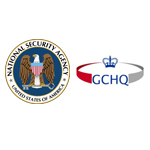
Analysts in the United States of America's National Security Agency are able, with legal authority, access much of the internet traffic of those they suspect of being terrorists, narcotics traffickers, arms proliferators and no doubt other international criminals.
The National Security Agency's (NSA) PRISM, the government's program that allegedly works with major internet companies to collect citizen's data, has allowed GCHQ (Government Communications Headquarters), a British intelligence agency responsible for providing signals intelligence (SIGINT) and information assurance to the UK government and armed forces, to benefit from that capability.
GCHQ's had access to the PRISM program on or before June 2010 and wrote 197 reports with it in 2012 alone. PRISM may have allowed GCHQ to circumvent the formal legal process required to seek personal materials.
The American and British politicians have assured that, in the wake of the revelations of the mass U.S. surveillance of phone, email and internet traffic. The electronic harvesting is in fact "very narrowly circumscribed", insist Barack Obama. The behavior of British intelligence services was declared to entirely "proper and fitting".
In the courtesy of the whistleblower Edward Snowden, people know that the U.S. National Security Agency is collecting 200 billion pieces of intelligence a month, taking up mobile records of more than 200 million U.S citizens, and collecting information from the world's largest internet companies with PRISM.
Power Against Privacy
With the ability to "spy" on almost every record and data, NSA and GCHQ have given as much about power as it is about privacy concerns. Surveillance and intelligence are tools of control, at home and abroad. The history of their abuse by the U.S. and British governments is voluminous, both in subverting and overthrowing foreign governments.
The NSA and GCHQ, whose collaboration is at the heart of the U.S. and British relationship, have been central to that for decades. Their global eavesdropping role is the cornerstone of the "Five Eyes" alliance of states (including Australia, Canada and New Zealand) which underpins the domination of western global power. Both agencies were founded to spy on the rest of the world, but ended up also targeting their own people.
Corporations have long been hand in glove with the secret state, working with the security services to this day to blacklist trade unionists and funding covert labor movement organizations during the Cold War. What's changed is that communication is in the hands of the corporations. And the companies whose servers are vacuumed up by PRISM are a the U.S. internet giants, from Google to Apple.
But as well as technology, it's the war on terror that has driven the hyper-expansion of the new security-industrial complex. Along with the meaningless catch-all justification of "national security", terrorism is invoked to justify all manner of anti-democratic innovations.
Internet giants have all declined that government has direct access to their servers. And as more internet companies are aware of the PRISM program, they are all assuring their users that their data are closed from the government, and only to be disclose if in accordance with the law and court order.